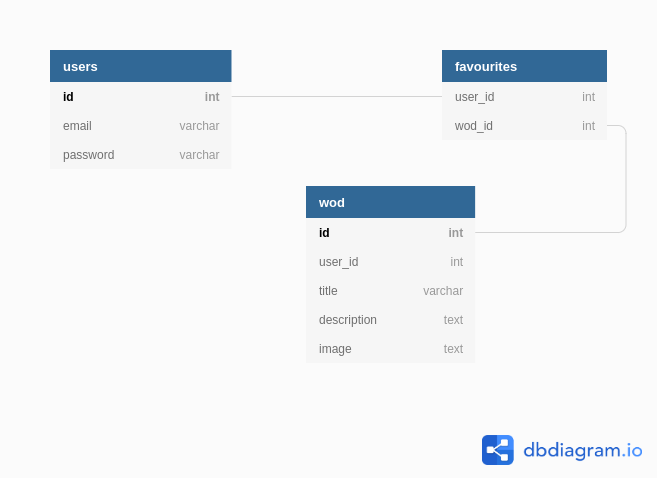This is a solo project at the end of the Microverse Main Technical Curriculum. It's a real-world-like project, built with business specifications to improve and test the achievement of technical and soft skills gained during the program. The technical requirements of this API project are:
- The database should have at least 2 tables
- Use Postgres as your database
- Back-end you will use Ruby on Rails
- Create a REST API to manage database resources
- Ruby on Rails
- JWT
- Heroku
This application is the back-end API used with the project Find My Wod - Front-End
The tables created are related according to the following diagram:
| Endpoint | Functionality |
|---|---|
| POST /users/new | Create Users |
| POST /authentication | Log In Users |
| GET /api/v1/wods | Get all Wods |
| GET /api/v1/wods/:id | Get all Specific Wod |
| GET /api/v1/favourites | Get all Favourited Wods |
| POST /api/v1/favourites | Add Wod to Favourites |
| DELETE /api/v1/favourites/:id | Remove Wod from favourites |
Clone the repository by clicking on "Clone or Download" and copy the given link. In your terminal, go to the folder where you want the project to be and use the following command:
git clone https://github.com/carlosveigadev/find-my-wod-backend.git
After that, open the folder with the code editor of your choice and follow the steps below.
Make sure you have Yarn installed in your machine.
Open the terminal and go to the folder of the game and run the following commands:
yarn install
bundle install
Those commands will ensure you installed the proper packages required and install all the gems needed for the project.
You need to configure the database with the following commands:
rails db:create db:migrate db:seed
This command will create the database, migrate the tables as necessary, and populate it with some data.
If you have any problem configuring postgresql, check this docs for more info
To start the server run:
rails s -p 3001
This command will make sure you run the project at the 3001 port, so you don't have any conflict with the front-end port, which is usually 3000.
To check the test run the following command:
bundle exec rspec
👤 Carlos Veiga
Contributions, issues, and feature requests are welcome!
Feel free to check the issues page.
Give a ⭐️ if you like this project!
- Microverse for the opportunity;
- The Minskins for the support.
This project is MIT licensed.
